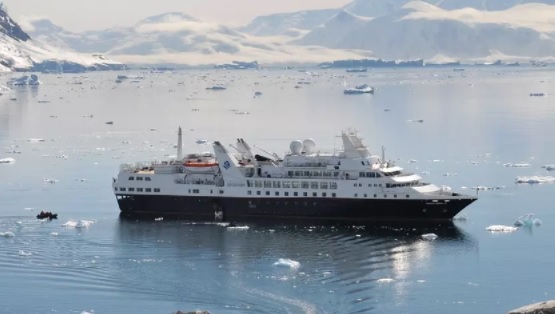Silversea Cruises to launch first-ever ship with hybrid power sources
The cruise industry’s first hybrid powered ship is set to debut summer 2023 as part of Royal Caribbean Group’s ultra-luxury brand Silversea Cruises.
The new class of ships, known as ‘Project Evolution,’ will operate using a trio of power sources including a fuel cell system, battery technology and dual fuel engines using liquefied natural gas (LNG) as the main fuel. This hybrid solution, using fuel cell technology, allows the ship to be free of local emissions while at port — another industry first.
“Silversea’s newest ship class is a significant leap forward in our commitment to sustainable ship design and our journey to reduce our environmental footprint,” said Richard Fain,Chairman and CEO, Royal Caribbean Group.
“We first announced our fuel cell ambitions several years ago. Through dedication and perseverance, we are now proud to introduce the first ship with large-scale fuel cell technology capable of achieving emission-free port operations.”
“Incorporating fuel cells into our ships now is one example of how Royal Caribbean Group is preparing to use new technologies as we move to a non-carbon-based future,” Fain continued. “This pioneering approach builds on our spirit of innovation.”
The new hybrid technology not only helps in port, but also allows Project Evolution to achieve a 40% overall reduction in its greenhouse gas emissions per double occupancy when compared to the brand’s previous class of ships. The ship class is also projected to achieve an Energy Efficiency Design Index (EEDI) rating approximately 25% better than applicable International Maritime Organization (IMO) requirements.
“Being at the forefront of sustainable shipping design and innovation is a testament to our team’s drive for continuous improvement,” said Roberto Martinoli, President and CEO, Silversea Cruises. “These advancements support our desire to showcase the world to our guests and to do so in a mindful and environmentally responsible way.”
Royal Caribbean Group is already known for a robust portfolio of technologies enhancing energy efficiency, waste treatment, and water management. This steady progress remains rooted in the company’s mantra of continuous improvement. It will drive The Group’s future as alternative, non-carbon-based solutions become available to support its overall decarbonization journey.
Project Evolution’s full suite of initiatives, developed in partnership with Meyer Werft Shipyard, will bring energy efficiency to a new level and will include both first-of-its-kind initiatives and successful features previously introduced such as:
- Fuel Cell System – this hydrogen-based technology will supplement the main power supply and carry the ship’s total hotel load — up to four megawatts — the first large-scale fuel-cell installation at sea in the cruise industry.
- LNG (Liquid Natural Gas) – a cleaner burning fuel, LNG-fueled propulsion systems emit less CO2 and 97% fewer particulates than normal fuel oil used on ships.
- Battery – a bank of batteries supports optimizing the overall ship power system, saving fuel.
- Waste to Energy – newly developed Micro Auto Gasification System (MAGS) reduces onboard waste volume, resulting in lower incineration emissions.
- Progress to Carbon Neutral Construction – in partnership with Meyer Werft Shipyard, Project Evolution is thoughtfully designed and built taking into consideration the carbon footprint of ship construction and creating a path to overall reduction.
For more than 30 years Royal Caribbean Group has invested in its commitment to sustainability. In partnership with World Wildlife Fund (WWF) in 2016, the company set specific, ambitious and measurable 2020 sustainability targets to reduce its environmental footprint, increase sustainable tourism, respect coastal communities and cultural heritage, and support WWF’s global ocean conservation work.
In addition, the company continues to advocate for sustainable practices globally, including collaborating with the United Nation’s High-Level Panel for a Sustainable Ocean Economy and committing to deliver on the promise of the Paris Agreement through partnership with the We Are Still In coalition.
Share this content:
Discover more from Tourism Press
Subscribe to get the latest posts sent to your email.














Leave a Reply